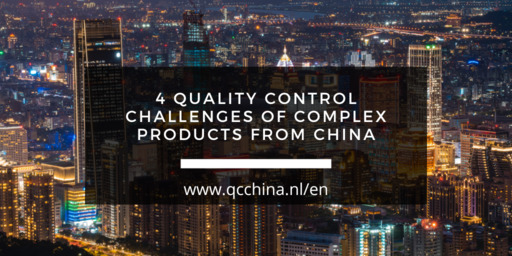4 Quality Control Challenges of Complex Products from China
For Western companies that import goods from China, attractive deals can sometimes lead to unexpected problems. In addition, some start-ups may overlook the importance of careful verification of their product quality. This article discusses four major challenges that importers of complex products from China may face.
Challenge 1: Complexity of Product Design
Complex products often have intricate designs with numerous parts and functions. This makes quality control during production more challenging. In order to manage this complexity, importers need to establish detailed specifications and control points at an early stage in the process.
Ensure that you and your suppliers have a clear understanding of product specifications. In addition, a quality control checklist helps identify design flaws and ensure the accuracy of all components.
Key Points:
- Define detailed specifications and checklists for product designs.
- Ensure suppliers have a clear understanding of established design requirements.
- Create a quality control checklist to promptly identify design flaws.
Challenge 2: Materials and Components
Complex products typically comprise diverse materials and components, elevating the risk of defects and making production control challenging. To ensure material and component quality, importers must conduct regular quality checks and establish strict standards and specifications.
Performing During Production Checks can help detect various defects early in production, maintaining the quality of materials and components.
Key Points:
- Regularly conduct quality checks to verify material and component quality.
- Establish strict standards and specifications for materials and components.
- Use During Production Checks to identify and rectify defects during production.
Challenge 3: Managing Multiple Suppliers
It can be challenging to manage multiple suppliers for complex products. Different suppliers provide different materials and parts. This increases the risk of defects and complicates control measures.
To ensure product quality, conducting a factory audit at each supplier before the actual production process is crucial. This ensures both the quality and reliability of suppliers you aim to collaborate with.
Additionally, this control measure prevents unreliable collaborations in manufacturing countries like China, Vietnam, India, Bangladesh, Pakistan, Turkey, or elsewhere in Europe.
Key Points:
- Conduct a factory audit at each supplier before the production process.
- Manage the risk of unreliable collaborations and assess suppliers based on performance and quality.
Challenge 4: Lack of Product Knowledge Among Suppliers
Quality control for complex products becomes challenging when manufacturers lack clear knowledge about a product’s function and requirements. Some products commonly used in the Western world may be completely unknown in other countries due to cultural differences.
If the factory workers who make your product have never seen or used such a product, it will be difficult to troubleshoot problems and ensure proper manufacturing.
For this reason, you should maintain open and clear communication with your suppliers. When in doubt, ensure proper execution of quality control processes by having an on-site quality inspector.
Key points:
- Assess a manufacturer’s competence beforehand.
- Establish open and clear communication with your suppliers.
- Consider sending technical experts to production locations.
Need more information?
For Western importers, addressing these challenges seriously and taking the necessary steps to ensure product quality is crucial. For more information on conducting quality controls in China or other manufacturing countries, feel free to contact us anytime.




